
views
- Uranic is a sexuality where you are attracted to men, masculine or androgynous non-binary people, or anyone who doesn’t identify (or present themselves) as a woman.
- Some people who use uranic also identify as non-binary—however, anyone of any gender can adopt this label to describe their sexual orientation.
- Similar micro-labels include marsic, which specifically describes non-binary individuals who feel attraction towards men and other masculine-aligned individuals.
What is Uranic Sexuality?

Uranic sexuality is the attraction to masculine non-binary people and men. It’s also defined as the attraction to everyone except women, woman-aligned people, or feminine-presenting non-binary (or enby) people. You don’t have to be any specific gender to use this label—you can identify as a man, woman, or non-binary person and also identify as uranic. The term “uranic” is relatively new. Tumblr user @loud-and-queer is often credited with coining this word in August 2017. This sexuality is also sometimes called “nofemsexual.” Uranic sexuality is different from “uranian,” the 1860’s word for homosexual men coined by Karl Heinrich Ulrichs.
Can anyone be uranic?
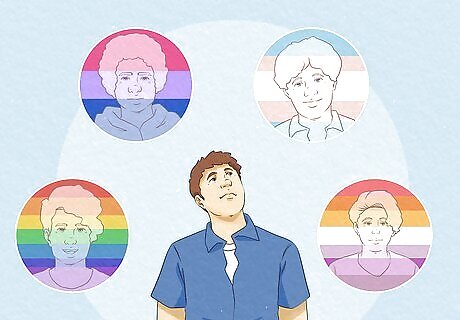
Yes, anyone can identify as uranic if they feel like the label describes them. Micro-labels like uranic can be incredibly validating. Not everyone feels comfortable with labels like gay, lesbian, or bisexual, and you’re totally free to use uranic if you feel like it fits. You also don’t have to use a label at all, and you can always change labels later. If you're thinking of using the uranic label, here are some questions to ask yourself: Do I feel attraction towards men and non-women? Do I feel attraction towards female-aligned or women-identifying people? Are there other labels that might fit me better, like gay, bisexual, or toric? If you answered “yes” to the first question and “no” to the other two, then the uranic label might be for you! You can also combine this label with other labels to more accurately describe your sexual orientation, like “uranic asexual” or “uranic grayromantic bisexual.”

Some feel like “uranic” is still too attached to the gender binary. Some people argue that uranic and similar labels can make them feel like they’re being put inside of the gender binary because they still base non-binary identities off male or female attributes. However you choose to identify is your choice, and that’s completely valid. The gender binary describes the traditional social idea that gender only comes in two forms—man or woman. However, many gender identities like non-binary or genderqueer exist between or completely outside of this binary.
Uranic Pride Flag
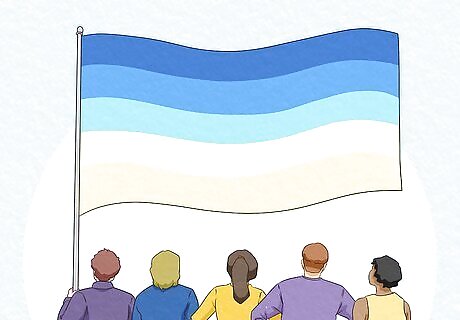
The uranic flag has either four or six bars with shades of blue and tan. Other versions of the flag include a simplified picture of the planet Uranus over the top of the striped flag in white and turquoise. There’s no known meaning for the colors of the flag, but some think that the blue shades come from the colors of the planet Uranus. The first uranic pride flag is believed to have been created by Tumblr user @loud-and-queer in September 2017.
Uranic Sexuality: Similar Orientation Labels
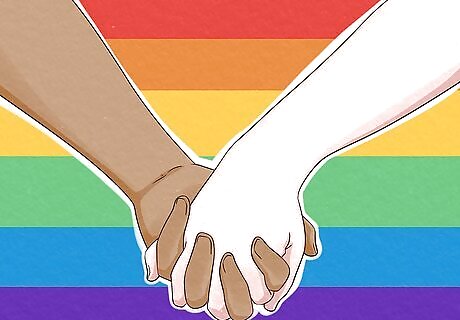
Gay Gay traditionally refers to a man or male-identifying person who is attracted romantically or sexually to other men. However, some women, agender, and non-binary people may also use this term to describe their sexuality. Uranic is different from gay because gay typically refers to men who love other men, while uranic can be used by anyone of any gender and describes the attraction towards masculine non-binary people as well as men.

Mascic Mascic is an umbrella term that describes a general non-straight attraction to men and masculine-aligned people. Some people might say that uranic falls under this umbrella, while others might argue that it’s a separate identity entirely.
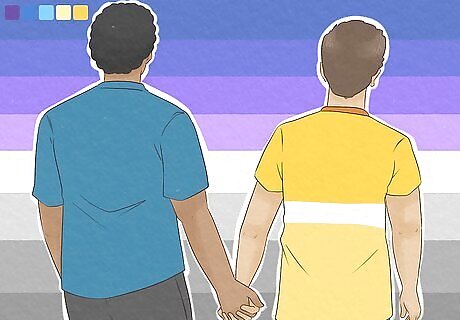
Nowomasexual Nowomasexual is an attraction to all genders except for binary women. This identity can include the attraction to cisgender men, transgender men, non-binary individuals, and female-aligned or woman-presenting individuals. Nowomasexual includes the attraction to female-aligned and woman-presenting individuals, while uranic means you aren’t attracted to those individuals.

Toric or Torensexual Toric refers to non-binary individuals who are non-exclusively or exclusively attracted to men and masculine-aligned individuals. Torensexual refers to people of any gender who are exclusively attracted to men and non-binary individuals. While toric specifically refers to non-binary attraction to other genders, you don’t have to be a certain gender to use uranic. The female or feminine equivalent of torensexual is trixensexual.
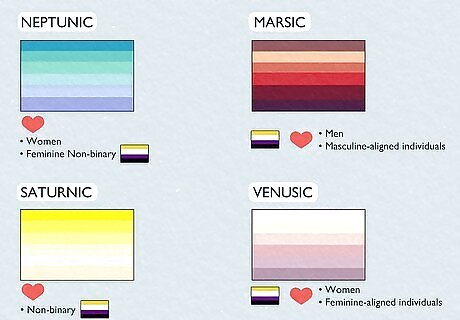
Neptunic, Saturnic, Marsic, and Venusic Uranic is not the only planet-themed sexuality for non-binary individuals to use! Some people might use Neptunic, Saturnic, Marsic, or Venusic instead. Here’s what each term means: Neptunic: Named after the planet Neptune, this sexuality refers to the attraction to women and feminine non-binary people—the opposite of uranic. Saturnic: Named after the planet Saturn, this sexuality refers to the attraction to only non-binary people, including man or woman-aligned individuals. Marsic: Named after the planet Mars, this sexuality describes non-binary individuals who are attracted to men and masculine-aligned individuals. Venusic: Named after the planet Venus, this sexuality refers to the attraction to only non-binary people who are femme or woman-aligned.
How to Be an Ally
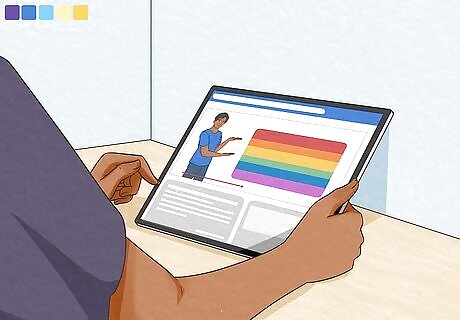
Educate yourself on LGBTQ+ terms and issues. Reading about different identities and orientations (like you’re doing right now) and learning what language to use can not only make sure you’re respectful to the people around you, but it can help you feel more confident when talking about LGBTQ+ issues. Another way to be respectful and inclusive is to ask what pronouns someone uses. While some people might use she/her or he/him, others may use they/them or use neopronouns like xe/xem/xir.

Speak up against prejudice and discrimination. If someone uses an offensive slur or phrase, gently correct them with the right language. When you speak up against LGBTQ+ misunderstanding and hate, it educates others and lets them know that those words aren’t acceptable, which can change how they act in the future.

Support and advocate for LGBTQ+ individuals publicly. Support policies at school, work, and in government that help protect LGBTQ+ people from discrimination. To stay informed and network with other allies, join an LGBTQ+ support group like PFLAG and show your support online. Here are other places you can check out to learn how to boost your voice as an ally: In your business: Human Rights Campaign In faith-based communities: Institute for Welcoming Resources In health fields: GLMA In schools: GLSEN In the workplace: Out & Equal Workplace Advocates



















Comments
0 comment